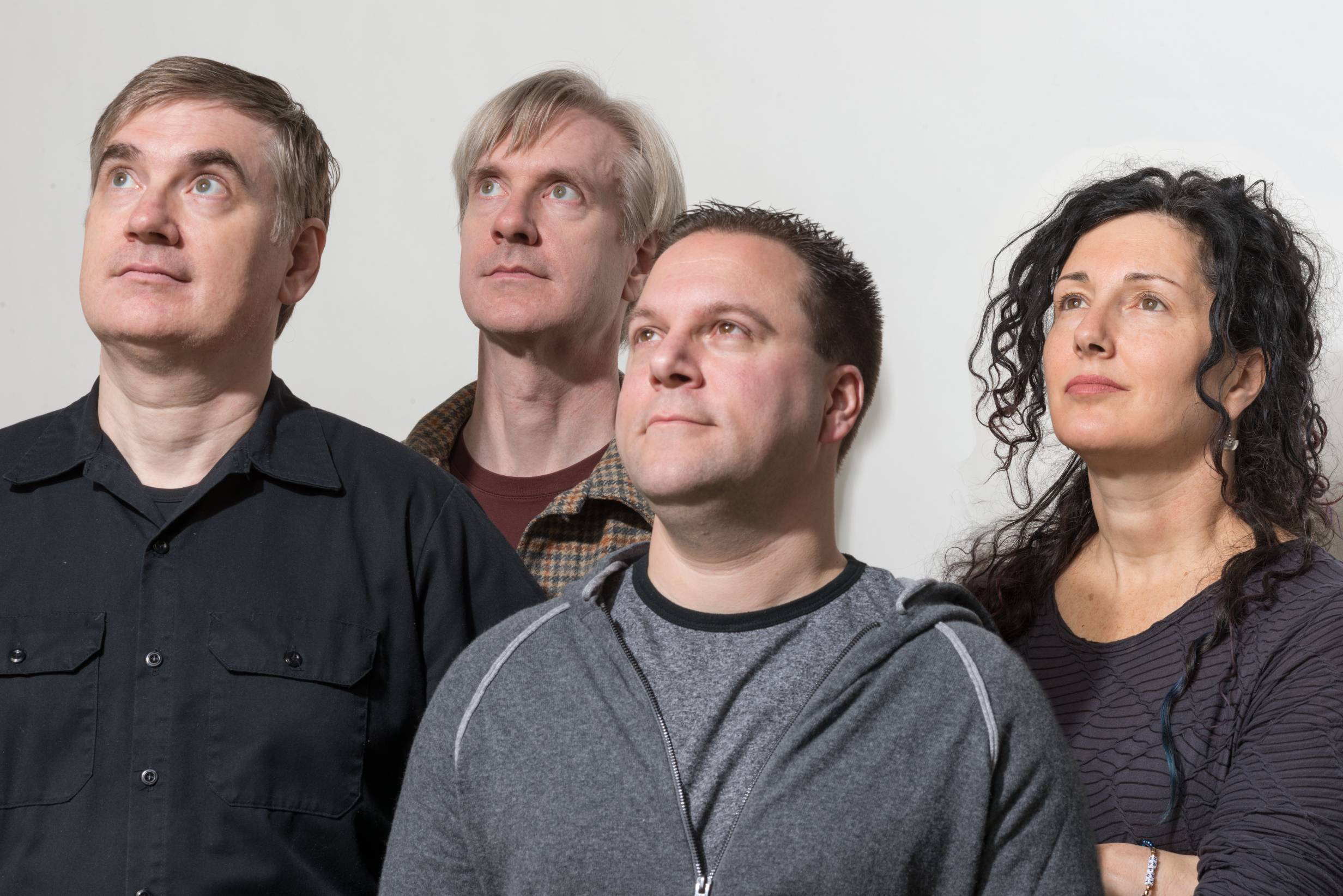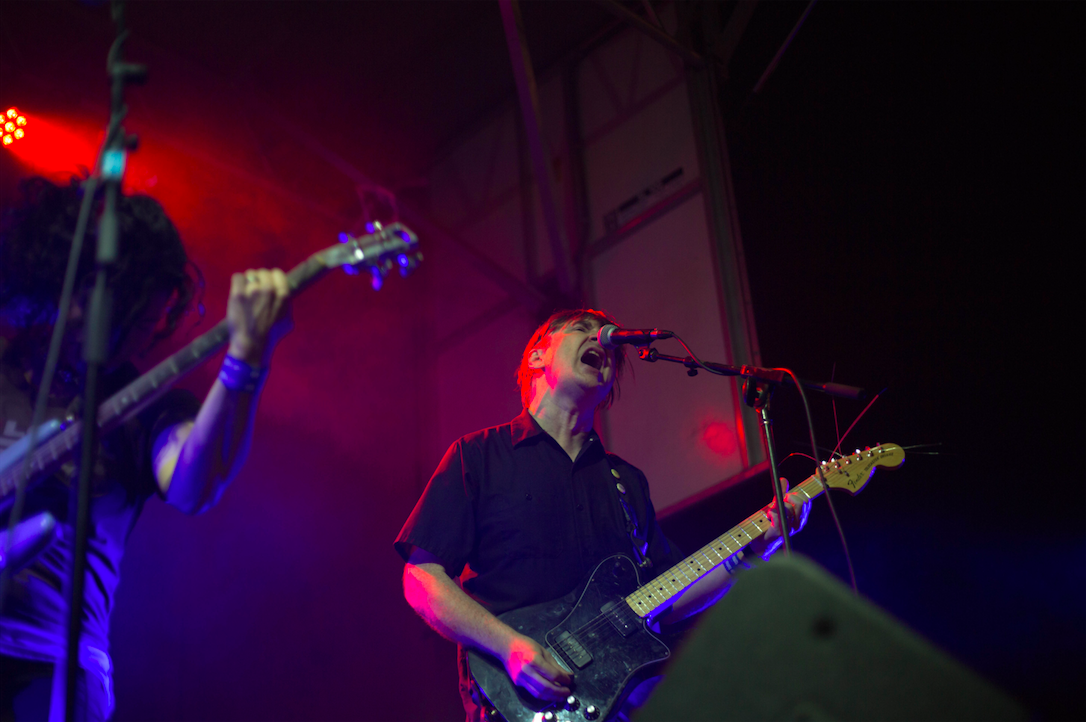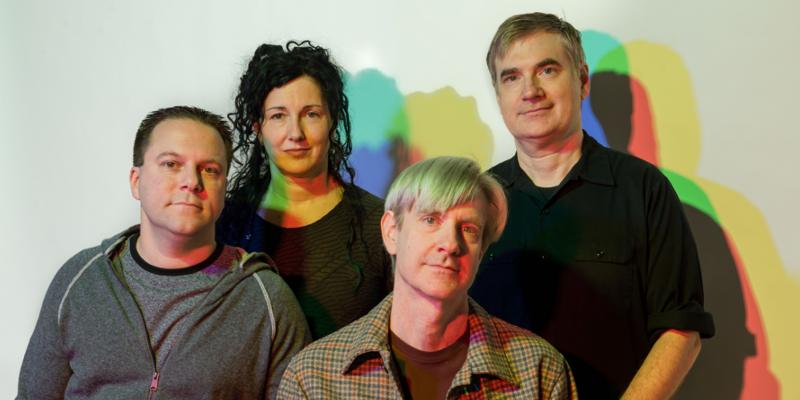By virtue of the fact that you are here, reading this music column, you probably already know about Poster Children. They were formed in 1987, while Rick Valentin and Rose Marshack attended the University of Illinois. Poster Children’s new record released in May, Grand Bargain!, was the band’s first release since 2004 — their first since No More Songs About Sleep and Fire. The four piece, comprised of the aforementioned Valentin (guitar, vocals) and Marshack (bass, vocals), Jim Valentin (guitar) and Matt Friscia (drums), has always been notoriously hard working — I can remember being in high school, and 107.1 (The Planet, at that time) constantly promoting Poster Children shows and releases.
The return of any band after a hiatus of any real length may elicit excitement and caution, simultaneously, from a fan, particularly when the band’s sound is based on bombastic, rebellious energy. A lot can change over the course of a decade, and one may wonder if the sound will remain, when the perspective, worldview, and the world itself, have undoubtedly changed.
Well, my friends, Grand Bargain! does not disappoint. At its core, the same gritty, energetic, punk remains, with a healthy dose of vitriol. In my mind, Poster Children have always occupied a sonic space adjacent to the Pixies, and as I soon as I heard the title track, that connection was reaffirmed in my brain.
Smile Politely: Tell me a little bit about the new album, Grand Bargain!
Rick Valentin: We started writing the songs late in 2015, early 2016. Recorded half of it in the summer of 2016 at Electrical Audio with Steve Albini, then wrote some more songs, and then recorded some more in the summer of 2017 at Electrical Audio with Steve, and then put out the record.
SP: Do you have a long relationship with Steve Albini?
Rose Marshack: Yeah, we do. We recorded half of our first record, Flower Plower, with him, and part of our second record, Daisychain Reaction, with him. I feel like he taught me everything that I know about the music business. He had a lot to say while we were recording with him. I’ve learned a lot from him.
SP: What’s his process like?
Rick: The last time we recorded with him was for our second record, which would have been in 1990. His process actually hasn’t changed that much. Electrical Audio is an analog studio, so we recorded to 2” tape. It was pretty much live to tape, with vocal overdubs. We didn’t do any digital shenanigans. That’s not Steve’s thing. When we played a song, if it wasn’t quite right, we’d wipe out the take, and do a new take. So every time we played a song, we had to figure out if it was our best version of it, or not.
SP: So all of the tracks are just the full band playing together — that’s what you hear on the new album?
Valentin: Yeah, a couple of guitar solos and vocals were put on afterwards, but everything else was done live.

SP: Is that how you’ve always done things?
Valentin: No! That’s how we used to do things, because we couldn’t afford to do anything else. As time went on, we did more and more complex studio stuff. So it was a little weird. Even though we are a loud rock band, for me, my recording attitude has become very digital, in a way, where it was, “It’s fine, we can fix that.” Even though we never did Poster Children songs completely deconstructed in the studio, that digital idea had infiltrated our way of recording. To go back with Steve, it was kind of a full circle thing. It was like, “Let’s try to make a record like we used to do.”
SP: Do you have any philosophical feelings about whether the live take has something added to it, versus overdubbing, where you can tweak, and perfect, and polish?
Valentin: When we re-released Daisychain Reaction, I listened back to it, and there were lots of mistakes in there that I wouldn’t let happen on a record later-on, so it kind of made me realize that, yeah, there’s something special in that energy. I don’t know if it’s “honest,” but even punk rock now is so… perfect, in a way. Everything sounds perfect: the guitar sounds perfect, the drums sound perfect. Even something that is supposed to be loose and energetic and live, like punk rock, has gotten very, very…
Marshack: Generic.
Valentin: Yeah, generic, in a way.
Marshack: Safe.
Valentin: Safe. But not even that, it’s just so uniform that nothing interesting is going on, because everything is so perfect. Perfection has infiltrated everything.
SP: So the return to the live take was an intentional decision?
Valentin: Oh yeah, definitely intentional. We made the choice: “OK, let’s do this the Steve way, the analog way.”
Marshack: A long time ago, we were recording, and Rick was doing vocals, and we were recording with Steve, and Rick messed up halfway through the vocals, and just went “RAAAAAAAAAAAAAAAAAH.” Steve just went, “OK, you’re done,” and I said, “Oh no, excuse me, Mr. Albini, he still has another chorus to go, and he messed up the verse right there,” and he said, “Oh no, I think it sounds good like that. Let’s move on.” I had to show him the lyrics, and point at them, and say, “We haven’t sang these yet.” So that’s the thing with Steve, he’s going to capture you live, in the moment.
SP: So what is the writing process like for you guys, and how has that evolved over the years?
Valentine: For most of the band’s history, we have gone into a room together, and we just start playing stuff, and it slowly turns into a song, and then I write lyrics on top, but that can take a long time. We used to have a 12 hour rehearsal, and by the end, maybe have a song, but now we all have families and kids, and we don’t have a lot of time, we couldn’t just say, “Oh, ok, we are going to spend a week, or a month, just playing,” and hope that 12 or 15 songs come out of it.
Marshack: We had to stop and feed our children.
Valentin: Jim, the other guitarist and I, had a bunch of riffs, so we’d put ‘em together, and Rose would come in and add the bass part, and then we’d bring that to our drummer, Matt. Then, in practice, we’d put it all together, instead of just hoping that something would happen in practice. We prepared ahead of time, and brought things in.

Poster Children performing at PYGMALION 2016, photo by Chloe Gerard.
SP: Has that changed the dynamic, or are they all still “Poster Children” songs at the end of the day?
Valentin: Grand Bargain! is definitely the old style. That just kind of came out of practice. The other songs were a little more structured, but the reality is that it is kind of hard for us not to sound like ourselves.
Marshack: The songs all grow out of the four of us, even now.
SP: Lyrically, Rick, is that pretty strictly your domain?
Valentin: Yeah, the lyrics are less collaborative. I don’t get much feedback. A little bit, but yeah. So once a song is kind of solidified, I’ll put lyrics on top of it.
SP: What’s the lyric writing process like for you?
Marshack: I’ll cut in here. Back when we had cable, he would just sit and watch CNN and get madder, and madder, and just write lyrics about politics. It’s been like that for every record.
Valentin: To be fair, what would happen is that I would spend time writing lyrics for most of the songs, but there would always be two or three that I would get stuck on, and that would happen. When we finish the music, the ones that I can think of a line or a chorus for are the ones that I work on. So we might have rifffs or something that are really cool, but if I can’t think of anything, then I don’t work on it until I can think of something. So that usually is the process–I have to have one or two lines, and then I go, “OK, I have to fill in all the blanks now.”
SP: Any personal favorite tracks?
Marshack: I don’t have a favorite song. There will be favorite songs to listen to, and usually I have a favorite song to play, but we haven’t played these songs out a lot, so I don’t even know. I don’t have a good answer for that. I really like “Grand Bargain”. I love Rick’s lyrics to “Grand Bargain”, and I kind of like the — what’s the Facebook song again?
Valentin: “Better Place”.
Marshack: “Better Place”. I like playing that song, and I like “Lucky Ones”. What about you, Rick?
Valentin: I don’t think about favorites. A lot of times, it will become obvious which ones people like more than others. Right now, we’re in the new record phase. After a year or two, the songs that everyone likes to play in the band, and the ones that people in the audience react really well to, those are the ones that survive long term. I’m a little resistant to playing old songs, but then I realized that sometimes when they are really old, you actually learn stuff that you had forgotten about.
SP: Is there any intentionality required to keep a cohesive sound going, or is it a natural process?
Valentin: I think that we may think that the songs are more different than they sound like from the outside.
Marshack: We are going through all the records, trying to pick out a couple songs to play for the upcoming shows, and I can tell when I was in the, “Oh, I’m going to play like the bass player of the Talking Heads” phase, or like, “Oh, that’s when I was trying to imitate the guy from Naked Raygun,” but yeah, like Rick said, we think our songs very different from each other, like, “Oh, that one is really slow and jangly, and this one is very metal.” We think most of our songs are very distinct from each other. We don’t think we have a sound, but I know that we do.
Valentin: Oh, we do.
Marshack: We do, we do.
Poster Children are presently on tour. You can stream or purchase Grand Bargain! here.
All photos by Nathan Keay unless otherwise noted.








